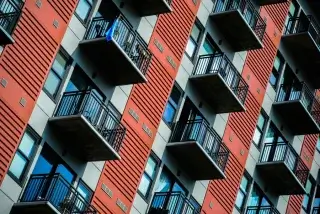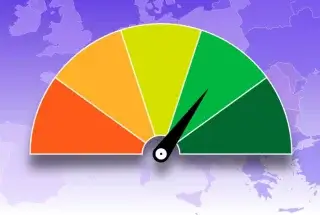Prices of Old Apartments in the Czech Republic Rise by 21%

Photo: Wikipedia
In all major Czech cities, the second half of 2025 saw a noticeable rise in the prices of old apartments. In the third quarter, the average price increased by 21% year-on-year, reaching 78,978 CZK (€3,255) per square meter. Compared with April–June, housing prices went up by 2%, reports Newstream, citing data from the real estate platform FérMakléři.cz.
The sharpest growth was recorded in Ústí nad Labem, where housing prices surged by 27% or 10,034 CZK (€413) — reaching 47,293 CZK (€1,945) per square meter. In Prague, prices rose by 12% — well-maintained older apartments now sell for 149,643 CZK (€6,160) per sq. m, nearly 1.3 million CZK (€53,500) more than a year ago. An 80-square-meter apartment in Prague is thus valued at almost 12 million CZK (€494,000). In Brno, a similar apartment costs 9.3 million CZK (€383,000), up 920,000 CZK (€38,000) year-on-year. In Ostrava, the average price reached 62,088 CZK (€2,555) per sq. m.

According to Lumír Kunz, managing director of FérMakléři.cz, none of the major Czech cities saw a decline in housing prices. However, quarterly increases of 1–4% indicate a stabilization trend. David Eim, vice-chairman of Gepard Finance, added that the mortgage market also remains calm: several banks temporarily reduced rates to 4.29%, but by the end of September, promotions ended, and rates returned to around 4.5%.
The monthly Hypomonitor report by the Czech Banking Association showed that in August 2025, financial institutions and building societies issued mortgages totaling 33.1 billion CZK (€1.36 billion) — 14% less than in July. Excluding refinancing, new loans amounted to 25.9 billion CZK (€1.07 billion) — down 11%, but still the second-highest figure of the year.
The average interest rate on new mortgages slightly decreased from 4.53% to 4.52%. Experts say the property market is gradually exiting the phase of volatility: price growth is slowing, mortgage rates remain relatively stable, and the sector appears to be entering a balanced period after years of sharp fluctuations.
The Czech Republic remains one of the most expensive housing markets in Europe. According to the Property Index by Deloitte, it ranks among the least affordable countries out of 18 surveyed. Buying a standard new apartment requires around 13.3 annual salaries, and in Prague — up to 15, making it the third least affordable capital on the continent. The gap between incomes and property prices is structural — driven by strong demand in economic centers and limited supply.
Institutional barriers — lengthy permitting processes and a chronic shortage of new housing — continue to push up prices even for old apartments, which are now in high demand.
Housing experts cite several main reasons: the low level of digitalization in construction procedures, frequent regulatory changes, and complex laws with numerous administrative requirements (including heritage protection).
These factors prolong the permitting process and delay new housing projects. As a result, even with moderate mortgage rates and a stable credit market, the secondary housing market remains supported by limited supply, making quarterly price growth of 1–4% look more like a plateau after volatility rather than a bubble. Still, this stability is fragile — regulatory shifts or borrowing cost fluctuations could easily disrupt the balance.
Market risks remain mixed. According to FérMakléři.cz, no major city has seen price declines, but some local corrections are visible outside main hubs. As reported by iDNES.cz, the cost of panel apartments in Strakonice fell by 12% in three months reports iDNES.cz. This episode highlights the heterogeneity of the market and greater sensitivity of peripheral locations to changes in demand.
At the same time, interest in single-family homes is increasing. This segment has been appreciating more slowly than apartments, and with stable mortgage rates, some buyers may switch to houses — potentially slowing down secondary apartment price growth in the regions.
Policy decisions — especially in taxation and urban planning — continue to introduce uncertainty and can have both stimulating and restraining effects.
Meanwhile, profitability remains limited: experts from Global Property Guide estimate rental yields at just 3.38% in 2025, with long payback periods. The overvaluation of housing also signals potential bubble risks in the Czech market.








